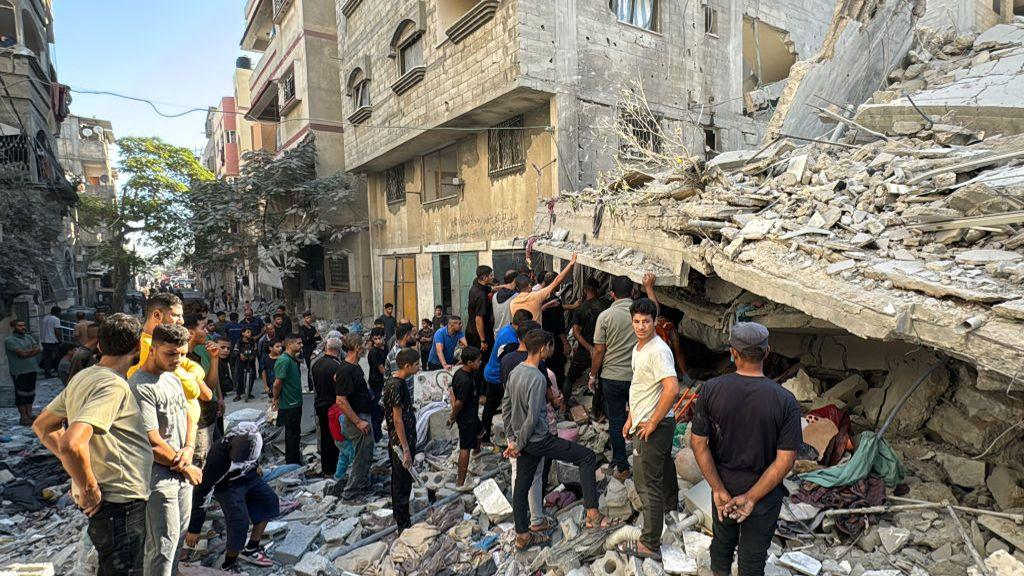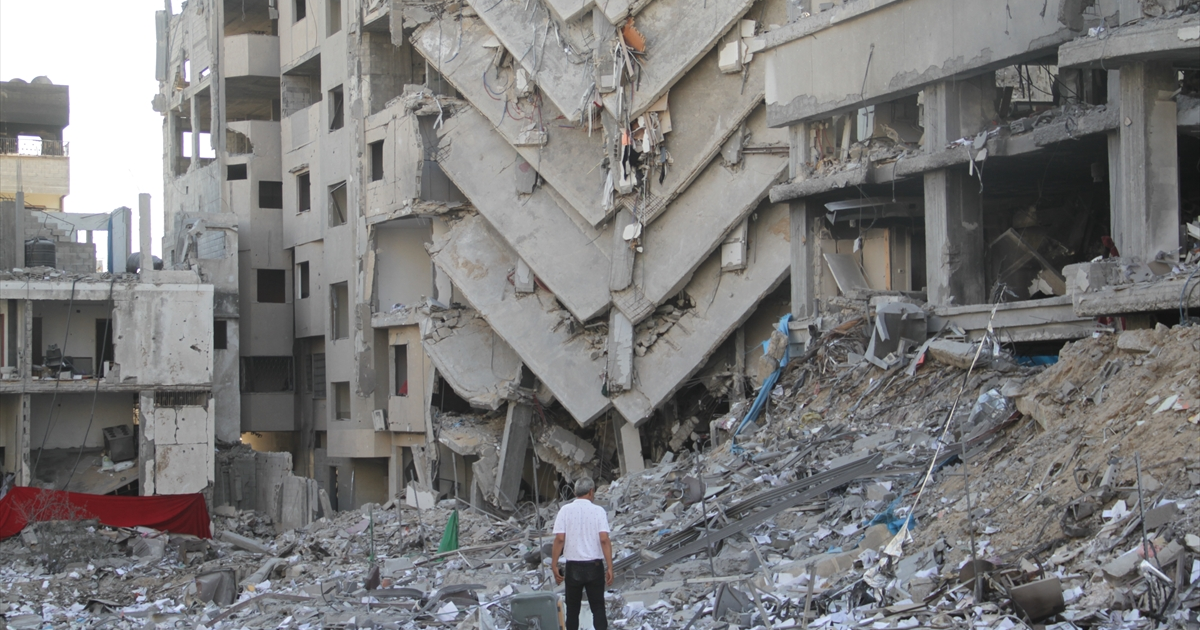The ongoing conflict between Israel and Hamas continues to take a devastating toll on Gaza, as over 100 people have been killed in recent Israeli airstrikes. As the fighting intensifies, particularly in Northern Gaza, the humanitarian crisis worsens with each passing day.
Despite international calls for an immediate ceasefire, the violence escalates, leaving civilians, including children and families, caught in the crossfire. The United Nations has described the situation as a “nightmare,” warning of the catastrophic consequences for the region. Amidst the devastation, questions about the fate of those left in Gaza and the future of peace in the region loom large.
Rising Death Toll: The Human Cost of War
The death toll in Gaza has risen sharply in recent weeks, with over 100 people killed in Israeli airstrikes aimed at eliminating Hamas militants. Medics on the ground describe the situation as nothing short of catastrophic.
Raheem Khedar, a local medic involved in rescue operations, shared grim accounts of parents and children being pulled from the rubble after a multistorey building and several neighboring houses were leveled by airstrikes. The loss of civilian life is overwhelming, with at least six more people, including a child, killed in a strike on a car in central Gaza’s Deir al-Balah.
Read : Ate Cooked Babies, Was Raped: Hostage Rescued From Gaza Reveals ISIS Brutality
The strikes have not only claimed lives but also left countless others injured, with over 40 people receiving critical medical attention across Northern Gaza. The region’s healthcare system, already on the brink of collapse due to prolonged conflict, is struggling to cope with the influx of wounded.
Mounir al-Bursh, Director General of the Gazan Health Ministry, described the health system’s dire situation, emphasizing how the renewed strikes are compounding an already fragile situation.
The human cost of war is undeniable, and the continued violence in Gaza serves as a stark reminder of the devastating impact of armed conflict on innocent civilians. Entire families have been torn apart, with homes reduced to rubble and lives forever altered.
The tragedy in Gaza is a humanitarian disaster, with medics, volunteers, and international organizations fighting against overwhelming odds to save lives amidst the destruction.
The UN’s Dire Warning: A Nightmare Unfolding
In response to the worsening situation in Gaza, the United Nations has issued a stark warning, calling the conflict a “nightmare” for those trapped in the war-torn region. The UN Special Coordinator for the Middle East Peace Process, Tor Wennesland, described the scenes unfolding in Northern Gaza as “horrifying” and emphasized the urgent need for an end to the violence.
Wennesland highlighted the relentless Israeli strikes, the deepening humanitarian crisis, and the lack of safe havens for civilians as reasons for global concern.
According to the UN, nowhere in Gaza is safe. The entire population of Northern Gaza, including Gaza City, was ordered to evacuate to the south in the war’s opening weeks, with Israel reiterating those instructions multiple times.
Yet, despite these orders, approximately 400,000 people remain in Northern Gaza, unwilling or unable to leave. For those who remain, the UN warns that the situation has become unbearable, with constant bombardments and nowhere to seek shelter.

The conflict in Gaza is not only a military engagement but also a humanitarian catastrophe, as the UN and other international bodies repeatedly call for humanitarian aid and ceasefire efforts. The global community is struggling to find ways to ensure the safety of the Palestinian people, deliver aid, and press for diplomatic efforts to secure peace. However, with each day that the conflict rages on, the hope for resolution seems more distant.
Humanitarian Aid and the Struggle for Peace
The humanitarian crisis in Gaza is reaching critical levels, as hospitals and medical facilities buckle under the pressure of treating a growing number of casualties. Doctors Without Borders, a leading humanitarian organization, has called on Israeli forces to “immediately stop” their assault on hospitals in Northern Gaza.
The Gazan Health Ministry has accused Israeli soldiers of firing on two hospitals, further aggravating the desperate situation in an already overwhelmed healthcare system.
In response, the Israeli military denied directly targeting hospitals, though they acknowledged operating near one of the facilities. They maintained that their strikes were precise and aimed at Hamas militants.
The broader issue of humanitarian aid in Gaza has become a focal point in international efforts to address the crisis. The UN and various non-governmental organizations (NGOs) are pushing for an uninterrupted delivery of aid to the Palestinians, who are struggling to survive amid the relentless air and ground assaults.
Access to food, water, medical supplies, and electricity is severely limited, with large parts of Gaza suffering from a lack of basic necessities.
Despite these dire circumstances, Israel has continued its operations in Gaza, insisting that the offensive is necessary to neutralize the threat posed by Hamas. The Israeli government has framed the strikes as a defensive measure, targeting militant infrastructure and preventing further attacks on Israeli civilians.
However, this approach has led to an alarming rise in civilian casualties and widespread destruction, raising critical questions about the proportionality of the response and the ethics of warfare in densely populated areas.

As the war in Gaza drags on, the international community faces a growing challenge in navigating the path to peace. The UN’s call for diplomacy and renewed efforts to bring the warring parties to the negotiating table is an urgent plea for an end to the suffering. Yet, the deep-seated animosities, historical grievances, and ongoing violence make the prospect of peace seem elusive.
The intensification of the Israeli strikes in Gaza and the growing humanitarian disaster have drawn worldwide attention, with the United Nations and various humanitarian organizations sounding the alarm.
As the conflict enters its third week, the situation in Northern Gaza is dire, with over 100 lives lost and countless others injured. Medics, volunteers, and international bodies are working tirelessly to mitigate the suffering, but the scale of the disaster is overwhelming.
The United Nations has described Gaza as a “nightmare,” where the relentless conflict has left civilians with no place to hide. The humanitarian crisis is deepening by the day, as hospitals are overwhelmed, and basic resources are becoming scarce. With Israel continuing its military operations and Hamas showing no signs of backing down, the path to peace seems uncertain.
In the midst of this ongoing tragedy, the international community must grapple with difficult questions about the ethics of war, the protection of civilians, and the future of peace in the region. Diplomacy, courage, and political will are essential if there is to be any hope of ending the violence and addressing the long-term grievances that fuel the conflict.
The people of Gaza and Israel deserve a future free from fear, violence, and suffering—a future where peace, justice, and stability can finally take root.

